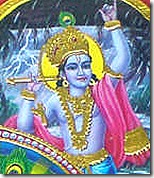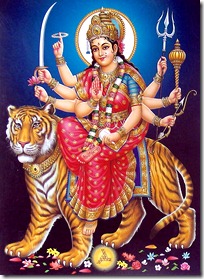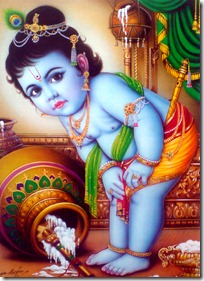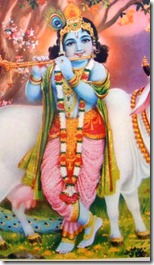 “The three miseries of material nature are not found in the pastimes of the Supreme Lord. As mentioned before, He is eternally joyful, and His transcendental pastimes are not different from Him.” (Shrila Prabhupada, Elevation to Krishna Consciousness, Ch 2) “The three miseries of material nature are not found in the pastimes of the Supreme Lord. As mentioned before, He is eternally joyful, and His transcendental pastimes are not different from Him.” (Shrila Prabhupada, Elevation to Krishna Consciousness, Ch 2)Goddess Durga, the mother of this material universe, holds the trident representing the threefold miseries of life in her hand. Those who are conditioned by the life around them, the temporary nature of matter and the debilitating effects of its association find this trident very difficult to overcome. In fact, the repeated punishment inflicted by this weapon can be too much to bear, as even death is only a resetting of positions, a time when things go back to square one and the punishment gets inflicted once again. But Mother Durga is only operating under the direction of a higher authority, one who is so kind and sweet that He will rescue anyone who approaches Him in a mood of sincerity and devotion. When there is no envy, greed, pride, anger, resentment, or hatred in the heart that is turned over to the Supreme Personality of Godhead, Lord Krishna, even Mother Durga, whose very name describes how difficult her forces are to overcome, becomes a friend. Her husband is the greatest devotee of Krishna after all, so why wouldn’t she help those who are only interested in hearing of Krishna’s pastimes and chanting the Lord’s glories?  What are the threefold miseries of life? Why just three? Don’t we suffer in a multitude of ways? In modern day politics there are perennial debates over which kinds of judges should be appointed to high positions. The factions generally fall into one of two camps. One side believes that a judge should follow the letter of the law, especially giving attention to the intent of the statutes at the time they were written. The other side considers revered documents like the Constitution to be “living and breathing” and thus taking on a life of their own, shaped to the specific time and circumstance. The fact that there is even a debate over how to interpret written law is itself an indication of the cheating propensity that exists in man. When a law code is given, it is meant to apply without prejudice. No amount of time passed can change the validity of a sense perception. Similarly, the original intent of a law doesn’t change with time. What are the threefold miseries of life? Why just three? Don’t we suffer in a multitude of ways? In modern day politics there are perennial debates over which kinds of judges should be appointed to high positions. The factions generally fall into one of two camps. One side believes that a judge should follow the letter of the law, especially giving attention to the intent of the statutes at the time they were written. The other side considers revered documents like the Constitution to be “living and breathing” and thus taking on a life of their own, shaped to the specific time and circumstance. The fact that there is even a debate over how to interpret written law is itself an indication of the cheating propensity that exists in man. When a law code is given, it is meant to apply without prejudice. No amount of time passed can change the validity of a sense perception. Similarly, the original intent of a law doesn’t change with time.The Vedas, the ancient scriptures of India, provide such profound wisdom that their teachings are equally applicable in any time period. Though there are seemingly many advancements today that make the lifestyles enjoyed previously look primitive, the relevance of the Vedic statements pertaining to the miseries of life has not changed. In the past maybe farmers had to worry about getting enough water for their crops and how to tackle certain diseases, while people today have to worry about internet hackers and massive unemployment caused by such factors as companies failing and jobs going overseas, but the three primary sources of misery have not changed in the least bit. In this way the Vedas prove their brilliance time and time again. One type of misery is known as adhidaivika. These are the pains inflicted by the divine personalities, or devas. In modern terms these forces are referred to as natural disasters or extreme weather events. Even many insurance policies have loopholes for earthquakes, floods, tornadoes and the like, for these are considered “acts of God”, or events that cannot be controlled. The miseries resulting from these forces are the hardest to predict and control, for they come unexpectedly and inflict punishment on the largest scale. Who could ever prepare for a massive earthquake or tsunami? After all the damage is done, what steps can be taken to even come close to finding the lifestyle previously enjoyed? Irrespective of time, place, or government policy, natural disasters will always be there, as nature is controlled by the aggregate results of action performed by the people of a society at large. Another source of misery is known as adhibautika, or those injuries inflicted by other living entities, or bhutas. A living entity is a person, animal or plant, i.e. anything with a life in it. Even a plant can inflict pain, as being pricked by a thorn or getting poison ivy is no fun. Then of course there are the crimes perpetrated by our fellow man. Murders, rapes, thefts, and overall violence are difficult to predict and control as well. Violence can occur in any place and at any time. Protection can be erected, but there is no place in this world that is completely free of the miseries inflicted by other living entities. Even something as simple as being cursed out or verbally insulted is an example of anadhibautika misery. The third kind of misery is adhyatmika, or those pains inflicted by the personal self. The atma is the self, or the soul. The individual atma is the essence of identity, and depending on its consciousness and the type of body it accepts, the actions taken up can be the cause of great misery. To use the most basic example, let’s say the individual living entity decides to watch a sporting event on television. There is anticipation, excitement and much attention given to this particular game. But as with anything in life, there is the possibility of any outcome occurring. Therefore there is a real likelihood of disappointment resulting from watching the game. When the favored team loses, the misery of dejection and sadness takes over. This is actually an adhyatmika misery because the individual living entity chose to watch the game. The dejection is actually due to the state of mind, the emotions that can be controlled if the consciousness is properly situated. Other examples of adhyatmika miseries are depression, illness, and general mental instability. When the Vedas declare that every type of misery can fall into one of the three aforementioned categories, there is no exception to the rule. Even time, which seems harmless enough, plays a role in adhyatmika miseries. When there is too much time on the hands, when there is nothing to do on say a Saturday night, the mind falls into depression. The worker dedicates so much effort during the week to the routine of maintaining the home and job that the weekend is seen as a time for fun. If there is too much free time and nothing to do, however, no amount of inactivity can provide any lasting satisfaction.  Though these miseries will always be present in a land divorced of its relationship to the original creator, as soon as the mind turns its eye towards that Supreme Person, the effects of the miseries will cease. Indeed, the soul is the impetus for action, but the higher soul, the Paramatma, is aloof to every seasonal change and distress. When the Supreme Person, the full manifestation of the Paramatma, is kind enough to visit this earth, the threefold miseries are completely absent from His activities, which are known as divine sports, or lila. Shri Krishna, as the Supreme Personality of Godhead, periodically descends to earth, similar to how a CEO will visit the jobsite from time to time. The regular workers must punch in and out and abide by the rules and regulations of the workplace, but the owner of the company can come and go as he pleases. He does not get punished for taking a two hour lunch or walking around in shorts and a golf shirt. Though these miseries will always be present in a land divorced of its relationship to the original creator, as soon as the mind turns its eye towards that Supreme Person, the effects of the miseries will cease. Indeed, the soul is the impetus for action, but the higher soul, the Paramatma, is aloof to every seasonal change and distress. When the Supreme Person, the full manifestation of the Paramatma, is kind enough to visit this earth, the threefold miseries are completely absent from His activities, which are known as divine sports, or lila. Shri Krishna, as the Supreme Personality of Godhead, periodically descends to earth, similar to how a CEO will visit the jobsite from time to time. The regular workers must punch in and out and abide by the rules and regulations of the workplace, but the owner of the company can come and go as he pleases. He does not get punished for taking a two hour lunch or walking around in shorts and a golf shirt.As the creator of the material energy, Lord Krishna is responsible for the threefold miseries. In one sense, He is also not responsible, for as soon as one leaves the company of the sweet and blissful Shyamasundara, painful and uncomfortable situations must arise. These miseries can be viewed as tremendous boons depending on the angle of vision. If I touch fire and my hand starts to burn, the pain inflicted serves as an indication to avoid the behavior in the future. Similarly, the threefold miseries of life serve as a wakeup call to the sleeping soul to get out of the clutches of material existence and instead take to divine life, or devotional service.  An easy way to do that is to simply hear about Krishna’s pastimes. What better way to transcend the miseries of Mother Nature, other living entities and the body and mind than to hear about the activities of the one person who is above such pains? The astute observer at this point may raise a few interesting questions. “You previously mentioned that time is included in the threefold miseries of life, as are natural disasters. When Krishna comes to earth, does time suddenly stop? If so, how does that work, especially when there is a time period tagged to the Lord’s descent, the duration of His stay on earth? Also, wasn’t there a massive flood in the holy land of Vrindavana during Krishna’s time? Isn’t this an example of an adhidaivika misery?” An easy way to do that is to simply hear about Krishna’s pastimes. What better way to transcend the miseries of Mother Nature, other living entities and the body and mind than to hear about the activities of the one person who is above such pains? The astute observer at this point may raise a few interesting questions. “You previously mentioned that time is included in the threefold miseries of life, as are natural disasters. When Krishna comes to earth, does time suddenly stop? If so, how does that work, especially when there is a time period tagged to the Lord’s descent, the duration of His stay on earth? Also, wasn’t there a massive flood in the holy land of Vrindavana during Krishna’s time? Isn’t this an example of an adhidaivika misery?”It is not that time and space are absent from the spiritual land or even from the areas where Krishna and His numerous incarnations visit. Krishna and His pastimes are above the threefold miseries of life because the forces inflicted have no effect. While Mother Durga holds the trident to punish those who desire to reside in devi-dhama, or the material universe, for Krishna this same weapon feels like the softest bed or a mink glove touching the skin. Fire is only harmful because of its effects on the objects it touches. Yet with Krishna even fire’s burning propensity doesn’t take effect. There were certainly time elements present in Vrindavana, the holy land where Krishna spent His childhood years some five thousand years ago, but they had no negative effect on anyone’s consciousness. Rather, even with the subtle changes in outward appearances of the residents of Vrindavana and in Krishna Himself, everyone remained completely spiritual, aloof to the threefold miseries.  As an example to prove this fact, there was a massive flood around Govardhana Hill instigated by Lord Indra, the king of the heavenly planets. Child Krishna, the darling of Vrindavana, one year had persuaded His father, Maharaja Nanda, to skip the annual Indra Puja and instead worship the sacred Govardhana Hill, which was supplying so much grass to the cows, which were the livelihood of the small farm community. Indra became angry at this transgression and sent forth a massive downpour of rain as revenge. Normally this would be considered one of the miseries of life, as a flood inflicts much damage on its affected areas. As an example to prove this fact, there was a massive flood around Govardhana Hill instigated by Lord Indra, the king of the heavenly planets. Child Krishna, the darling of Vrindavana, one year had persuaded His father, Maharaja Nanda, to skip the annual Indra Puja and instead worship the sacred Govardhana Hill, which was supplying so much grass to the cows, which were the livelihood of the small farm community. Indra became angry at this transgression and sent forth a massive downpour of rain as revenge. Normally this would be considered one of the miseries of life, as a flood inflicts much damage on its affected areas.Krishna, however, is above the threefold miseries of life and so is anyone who takes shelter of Him. The residents of Vrindavana had no other savior except Krishna, so when they saw the massive flood, they immediately looked to Him for safety. The young Krishna then lifted up the massive Govardhana Hill and held it over His head as an umbrella. In this way there was no pain inflicted from Indra’s flood. This incident was only one small example out of countless other pastimes that illustrated the same principle.  For the fallen souls of this age who don’t have Krishna’s personal presence to protect them, tapping into the treasure house of knowledge and wisdom that is Vedic literature can actually provide the same shelter. There is no difference between Krishna and His pastimes, so anyone who regularly hears them will gradually develop immunity to the threefold miseries of life. Of all the ways of connecting with Krishna, or God, the best is chanting His names on a regular basis, “Hare Krishna Hare Krishna, Krishna Krishna, Hare Hare, Hare Rama Hare Rama, Rama Rama, Hare Hare”. For the fallen souls of this age who don’t have Krishna’s personal presence to protect them, tapping into the treasure house of knowledge and wisdom that is Vedic literature can actually provide the same shelter. There is no difference between Krishna and His pastimes, so anyone who regularly hears them will gradually develop immunity to the threefold miseries of life. Of all the ways of connecting with Krishna, or God, the best is chanting His names on a regular basis, “Hare Krishna Hare Krishna, Krishna Krishna, Hare Hare, Hare Rama Hare Rama, Rama Rama, Hare Hare”.This sacred formula should be repeated day and night, from childhood to old age. If there is any spare time in the day, when the effects of nature try to attack the idle mind, simply remember Krishna, glorify Him, and deliver the sound vibration of His holy name to the ears. By following this formula, Mother Durga becomes a friend. When Krishna comes to earth, she and other celestial figures accompany the Lord and help Him in His mission of reinstituting the principles of dharma and giving protection to the innocent. Along the same lines, those who make devotional service their life and soul get help from Krishna’s friends, who ensure that at the end of life, the cycle of birth and death comes to a complete stop. |
Search This Blog
Monday, August 29, 2011
Fire That Doesn’t Burn
Subscribe to:
Post Comments (Atom)
No comments:
Post a Comment